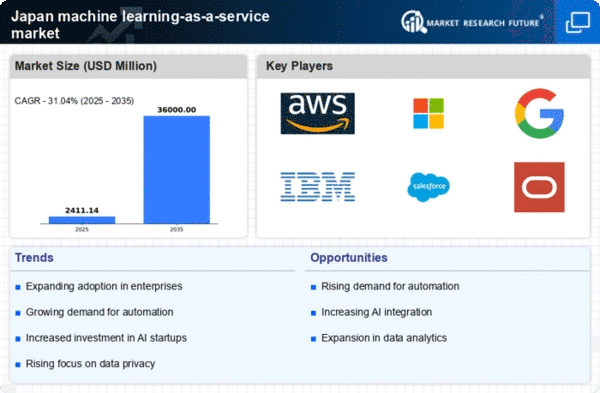Emergence of Edge Computing
The rise of edge computing is reshaping the technological landscape in Japan, presenting new opportunities for the machine learning-as-a-service market. By processing data closer to the source, edge computing reduces latency and enhances real-time decision-making capabilities. This shift is particularly relevant for industries such as manufacturing and logistics, where timely data analysis is critical. As companies increasingly adopt edge computing solutions, the demand for machine learning-as-a-service offerings that can operate efficiently in edge environments is expected to grow. This trend indicates a potential expansion of the machine learning-as-a-service market, as organizations seek to harness the benefits of both edge computing and machine learning.
Increased Focus on Cybersecurity
As cyber threats continue to evolve, organizations in Japan are placing a heightened emphasis on cybersecurity measures. This trend is influencing the machine learning-as-a-service market, as businesses seek to implement advanced machine learning algorithms to detect and mitigate potential security breaches. The market for cybersecurity solutions in Japan is anticipated to grow to $10 billion by 2026, with machine learning playing a crucial role in enhancing threat detection capabilities. Consequently, the integration of machine learning-as-a-service offerings into cybersecurity frameworks is likely to become a priority for many organizations, thereby driving growth in the machine learning-as-a-service market.
Rising Demand for Data Analytics
The machine learning-as-a-service market in Japan is experiencing a notable surge in demand for data analytics solutions. As organizations increasingly recognize the value of data-driven decision-making, the need for sophisticated analytics tools has grown. In 2025, the market for data analytics in Japan is projected to reach approximately $2 billion, reflecting a compound annual growth rate (CAGR) of around 15%. This trend is likely to drive the adoption of machine learning-as-a-service offerings, as businesses seek to leverage advanced algorithms to extract insights from vast datasets. Consequently, the machine learning-as-a-service market is positioned to benefit from this growing emphasis on data analytics, enabling companies to enhance operational efficiency and improve customer experiences.
Government Initiatives and Support
The Japanese government is actively promoting the adoption of artificial intelligence and machine learning technologies, which significantly impacts the machine learning-as-a-service market. Initiatives such as the 'AI Strategy 2025' aim to foster innovation and encourage businesses to integrate AI solutions into their operations. With substantial funding allocated to research and development, the government is creating an environment conducive to the growth of machine learning services. This support is expected to enhance the market landscape, as companies are more likely to invest in machine learning-as-a-service solutions, knowing they have governmental backing. As a result, The machine learning-as-a-service market is likely to expand. This expansion is driven by both public and private sector collaboration.
Growing Interest in Personalized Customer Experiences
In Japan, businesses are increasingly recognizing the importance of delivering personalized customer experiences, which is driving the demand for machine learning-as-a-service solutions. By leveraging machine learning algorithms, companies can analyze customer behavior and preferences to tailor their offerings effectively. The market for personalized marketing solutions is projected to reach $1.5 billion by 2025, indicating a robust growth trajectory. This trend suggests that organizations are likely to invest in machine learning-as-a-service to enhance their customer engagement strategies. As a result, the machine learning-as-a-service market is expected to flourish, fueled by the desire to create more meaningful interactions with customers.
















